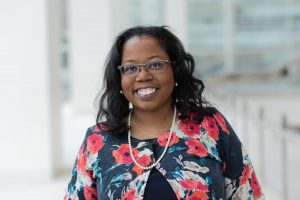
As a child growing up in New York City, Diane Carol Gooding loved the cultural diversity: the museums, the performances, and the constant hum of bustling sidewalks filled with all kinds of people, including those acting, well, strangely. “My parents told me they were probably not well,” Gooding recalls, “and that we needed to be compassionate towards them.” Gooding’s interest in diverse expressions of mental health developed over time: early on, she nurtured an interest in the plight of the homeless, then became a volunteer camp counselor for deaf and intellectually disabled children, and, as a college student at Harvard-Radcliffe, got involved in a research lab, helping people with different psychiatric illnesses through experimental protocols.
Now, as a professor of psychology, Gooding researches mental illness, primarily schizophrenia and schizophrenia-spectrum disorders, and teaches classes on abnormal psychology and media and mental illness. Her work investigating risk factors for the later development of disorders led to her development of ACIPS, or Anticipatory and Consummatory Interpersonal Pleasure Scale, a self-report measure of social anhedonia (an absence of pleasure derived from social interactions). The ACIPS, which was intended primarily for research use but has seen an uptick in requests from clinicians, is the only anhedonia measure that can be administered to children and adolescents as well.
Recognizing mental health challenges early has long been important to Gooding. “When I started teaching [in 1996], students would privately disclose a personal or family history of mental illness to me. Some students would admit that they had been dissuaded from applying to competitive schools like UW–Madison because of their own mental health challenges. In some cases, I ended up contacting high school guidance counselors and talking to them about mental illness stigma. Thankfully, over the years, students have become more open about their own mental health issues, and are more likely to openly discuss it amongst their classmates and in discussion groups.”
Her interest in addressing mental health goes beyond the classroom, evidenced by her decades-long involvement with the National Alliance on Mental Illness. In her current role as vice president of the NAMI-Dane County Board, she works to break down barriers and stigmas surrounding mental illness, increase mental health literacy, and help people find access to mental health treatment. “Some of the biggest obstacles to accessing mental health treatment are that people don’t always recognize when they need it, and [don’t see] that they’re deserving of help.”
An active member of The Links, Incorporated, an international organization committed to enriching, sustaining, and ensuring the culture and economic survival of African Americans and other persons of African descent, Gooding leads community workshops on suicide prevention, provides mental health information at health fairs, and—during the pandemic—distributes free reusable masks for adults and children.
“Professor Gooding’s outreach to the mental health community is the embodiment of the Wisconsin Idea,” says Department Chair and Professor Craig Berridge. “Millions of Americans, including Wisconsinites, suffer mental health disorders. Not only are they suffering the consequences of serious medical conditions, they are also contending with the stigma associated with a mental health diagnosis that unfortunately persists in our society. Professor Gooding is providing much needed passion, compassion, and expertise to help those in need.”
That need, perhaps, has never been greater than now, particularly among college students.
“The pandemic has made it evident how great the need is for more student mental health resources,” says Gooding. From anxiety and depression to obsessive-compulsive and bipolar disorders, the late teens and early 20s are when these mental illnesses often appear. “I keep writing to my students to remind them to be kind and patient with themselves, with each other, and to reach out for help.”
For Gooding’s part, she finds that she simply feels better when she’s helping others. “I love it when I can talk to a group and just connect with people who decide to get help, or realize it’s okay to take the meds they’ve been prescribed. I love it when I can reach people.”
And reaching people—through her research, her teaching, and her outreach— is what Gooding does.
To get involved with NAMI or The Links, Incorporated, visit nami.org or linksinc.org.